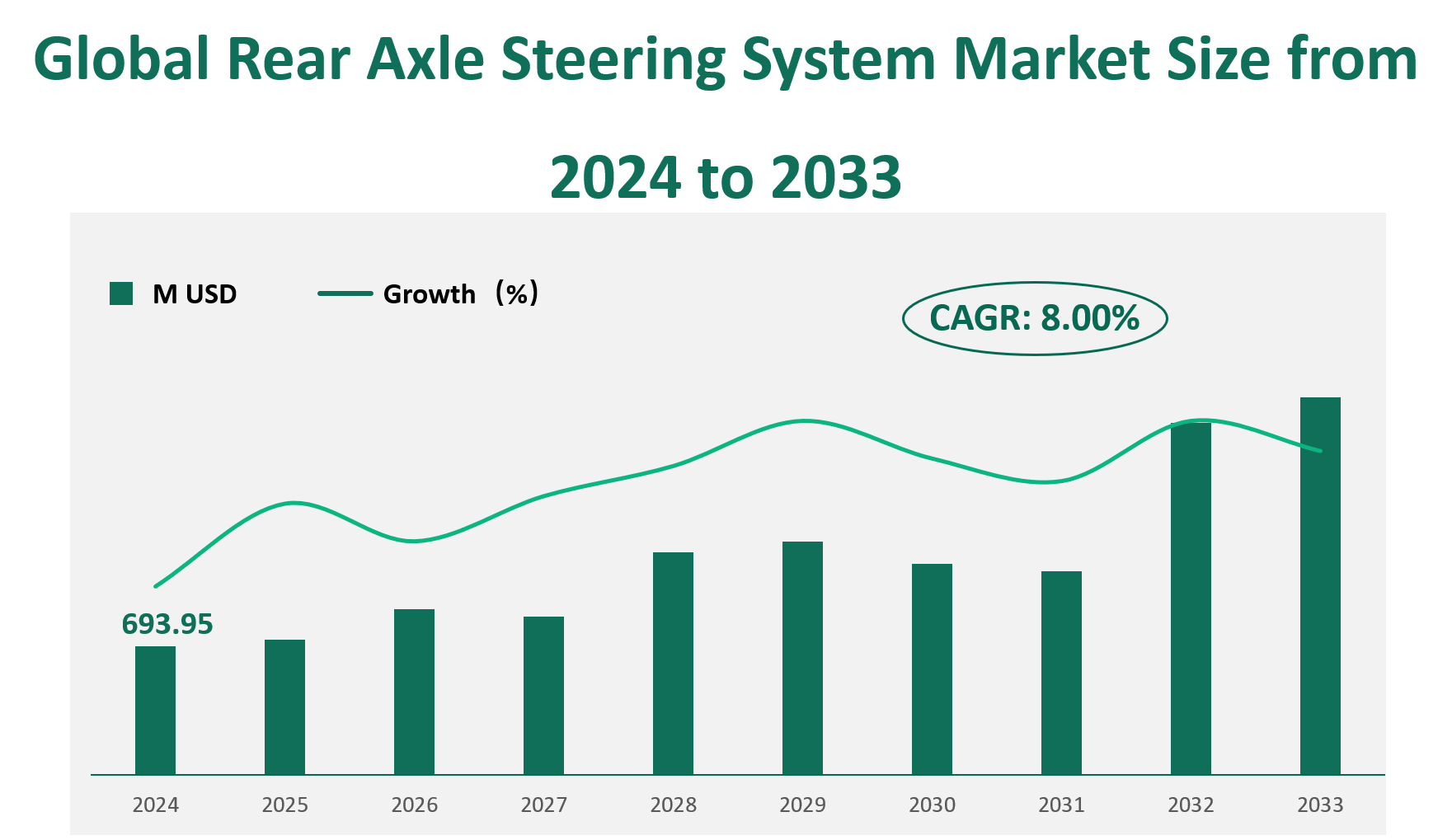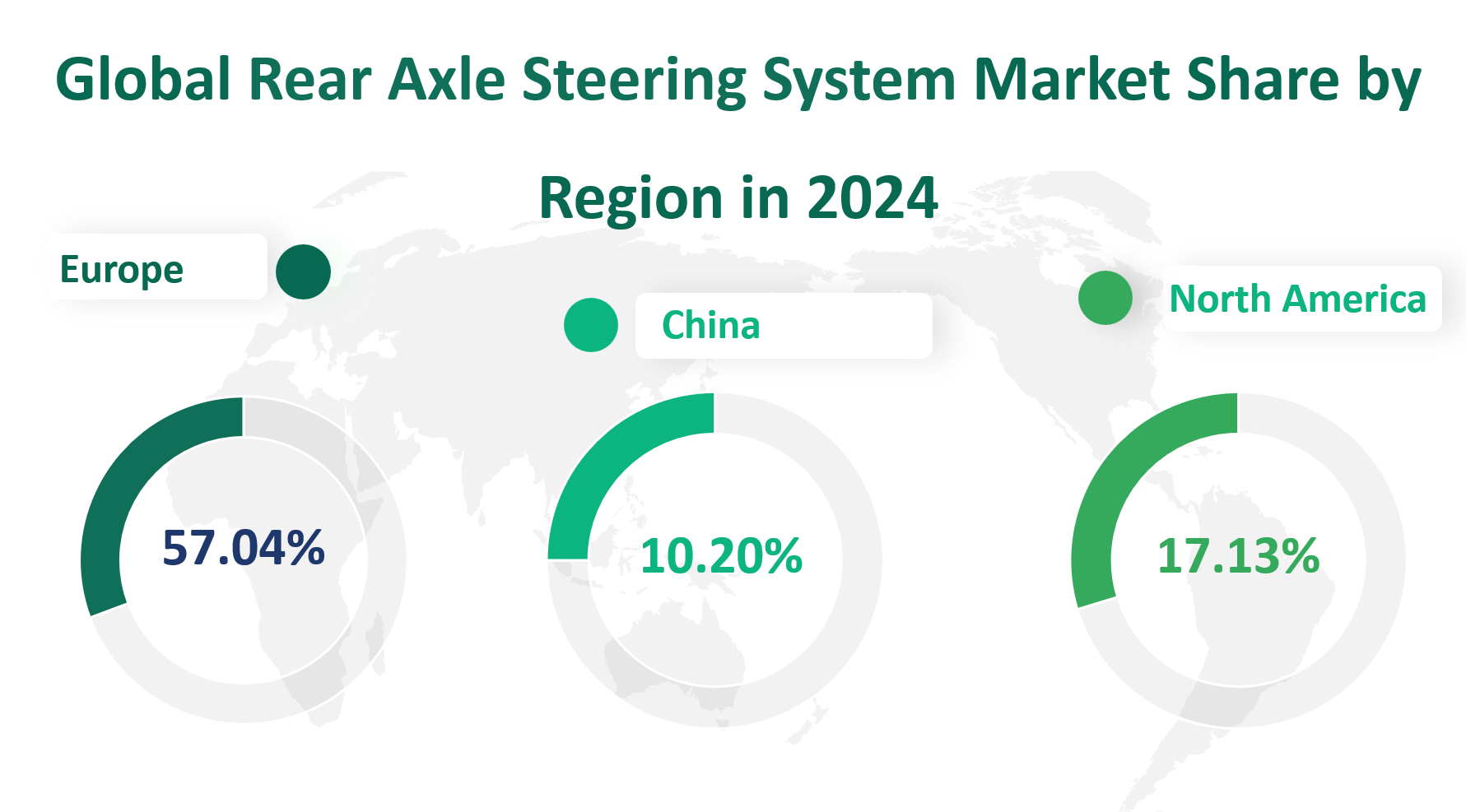1. Global Rear Axle Steering System Market Insight Analysis
The global Rear Axle Steering System (RASS) market is projected to reach a revenue of $693.95 million USD in 2024, with a Compound Annual Growth Rate (CAGR) of 8.00% from 2024 to 2033.
The Rear Axle Steering System is a sophisticated automotive technology designed to enhance vehicle maneuverability and stability by allowing the rear wheels to steer in conjunction with the front wheels. This system is particularly beneficial in improving handling during low-speed maneuvers, such as parking, and high-speed stability during lane changes or evasive actions.
The Rear Axle Steering System consists of several key components, including a cylinder unit with an integrated position sensor and valve system, as well as a power unit comprising a motor-driven electric pump and control unit. Depending on the vehicle’s design and available space, two primary variants are utilized: the single/central actuator and the dual actuator. The single actuator is installed at the center of the axle and controls both wheels via a toe link, while the dual actuator system allows each wheel to be steered independently. This technology offers significant advantages, such as reduced turning radius, improved stability at high speeds, and enhanced overall vehicle safety.
Figure Global Rear Axle Steering System Market Size (M USD) and CAGR (2024-2033)

2. Driving and Limiting Factors of Rear Axle Steering System Market Growth
The growth of the Rear Axle Steering System market is influenced by several key drivers and limiting factors. On the positive side, increasing demand for vehicle safety and enhanced driving dynamics is a major driver. Governments worldwide are mandating stricter safety standards, pushing automakers to integrate advanced steering technologies like RASS into their vehicles. Additionally, the rise in consumer demand for comfortable and safe vehicles is fueling the adoption of rear axle steering systems. These systems not only improve maneuverability but also enhance stability during high-speed driving, making them an attractive feature for both passenger cars and commercial vehicles.
Another significant driver is the increasing presence of major automotive OEMs and aftermarket players in regions like Europe and North America. These regions have a strong focus on automotive innovation and are home to several economically stable countries with advanced automotive research institutions. The presence of key players such as ZF Friedrichshafen, Bosch, and Aisin Group further supports market growth through continuous technological advancements and product development.
However, the market also faces several limiting factors. One of the primary challenges is the fluctuation in raw material prices. The cost, quality, and availability of raw materials such as stainless steel and aluminum are significantly affected by global supply and demand dynamics, regulatory changes, and geopolitical factors. These fluctuations can lead to increased production costs for manufacturers, potentially impacting profit margins and market growth.
Another limiting factor is the high cost associated with the Rear Axle Steering System. The technology is currently integrated primarily into premium and mid-end vehicles due to its high initial cost and the additional complexity it brings to the vehicle’s steering system. This high cost not only affects the affordability of vehicles equipped with RASS but also increases maintenance and repair costs, which can deter potential buyers.
3. Technology Innovation and Corporate Mergers and Acquisitions in Rear Axle Steering System Market
The Rear Axle Steering System market is characterized by continuous technological innovation and strategic corporate activities. Major players in the market are constantly investing in R&D to improve the efficiency, cost-effectiveness, and performance of their products. For example, ZF Friedrichshafen has developed the Active Rear Axle Steering (AKC®) system, which offers enhanced maneuverability and stability through advanced control algorithms and modular kit systems. This technology allows for both central and dual actuator variants, providing flexibility to meet different vehicle requirements.
Corporate mergers and acquisitions are also playing a significant role in shaping the market landscape. For instance, Bosch’s acquisition of ZF Lenksysteme in 2015 strengthened its position in the steering system market by integrating advanced technologies and expanding its product portfolio. Similarly, ZF Friedrichshafen’s acquisition of WABCO in 2020 has further enhanced its capabilities in commercial vehicle technology, positioning it as a leading player in the global market.
4. Global Rear Axle Steering System Market Size by Type
The rear axle steering system is a crucial automotive technology designed to improve vehicle stability, maneuverability, and safety. It operates by allowing the rear wheels to turn in the same or opposite direction as the front wheels, depending on the driving conditions. The system is particularly beneficial in tight spaces, high-speed maneuvers, and evasive actions. There are two primary types of rear axle steering systems: Single/Central Actuator and Dual Actuator.
The Single/Central Actuator, also known as the single actuator, is installed at the center of the axle and controls both rear wheels via a single actuator. This design simplifies the system, reduces cost, and is suitable for a wide range of vehicles, including passenger cars and commercial vehicles. The central actuator system is particularly effective in enhancing low-speed maneuverability and high-speed stability. In 2024, the market revenue for the Single/Central Actuator type is projected to be $388.76 million, accounting for approximately 56.02% of the total market revenue.
The Dual Actuator system features two separate actuators, each controlling an individual rear wheel. This design offers greater precision and flexibility in steering control, making it ideal for high-performance vehicles and commercial vehicles that require enhanced stability and maneuverability. The dual actuator system is particularly beneficial in heavy-duty applications and vehicles with complex suspension systems. In 2024, the market revenue for the Dual Actuator type is expected to be $305.19 million, representing 43.98% of the total market revenue.
Table Global Rear Axle Steering System Market Size by Type in 2024
Market Size (M USD) 2024 | Market Share | |
Single/Central Actuator | 388.76 | 56.02% |
Dual Actuator | 305.19 | 43.98% |
5. Global Rear Axle Steering System Market Size by Application
The rear axle steering system is widely used in various applications, primarily in passenger cars and commercial vehicles.
Passenger cars are the largest application segment for rear axle steering systems. These vehicles benefit significantly from the enhanced maneuverability and stability provided by the rear axle steering system. The system allows for easier parking, tighter turning circles, and improved high-speed stability, making it particularly attractive for premium and mid-range passenger cars. In 2024, the market revenue for rear axle steering systems in passenger cars is projected to be $506.73 million, accounting for 73.02% of the total market revenue.
Commercial vehicles, including trucks and buses, also benefit from rear axle steering systems. The system enhances stability, reduces tire wear, and improves fuel efficiency, making it a valuable addition to heavy-duty vehicles. The rear axle steering system is particularly beneficial in commercial vehicles that operate in challenging environments, such as construction sites and long-haul transportation. In 2024, the market revenue for rear axle steering systems in commercial vehicles is expected to be $187.22 million, representing 26.98% of the total market revenue.
Table Global Rear Axle Steering System Market Size by Application in 2024
Application | Market Size (M USD) 2024 | Market Share |
Passenger Car | 506.73 | 73.02% |
Commercial Vehicle | 187.22 | 26.98% |
6. Global Rear Axle Steering System Market by Top Regions
Europe remains the largest market for Rear Axle Steering Systems, with a projected revenue of $395.79 million in 2024. This dominance is attributed to the region’s strong automotive industry, presence of major OEMs, and high demand for premium vehicles equipped with advanced safety and performance features.
North America is the second-largest market, with an estimated revenue of $118.90 million in 2024. The region’s market growth is driven by increasing demand for high-performance vehicles, stringent safety regulations, and technological advancements in the automotive industry.
China is emerging as a fast-growing market, with a projected revenue of $70.81 million in 2024. The rapid growth of the automotive industry in China, coupled with increasing consumer demand for advanced vehicle features, is driving the adoption of rear axle steering systems.
Japan is another significant market, with an estimated revenue of $46.09 million in 2024. The Japanese market is characterized by a high demand for advanced automotive technologies, particularly in luxury vehicles and commercial trucks.
Figure Global Rear Axle Steering System Market Size by Region in 2024

7. Global Rear Axle Steering System Market Analysis by Major Players
7.1 ZF Friedrichshafen
Introduction and Business Overview: ZF Friedrichshafen AG, commonly known as ZF Group, is a global leader in driveline and chassis technology. Founded in 1915, the company is headquartered in Friedrichshafen, Germany. ZF specializes in engineering and manufacturing automotive components, including rear axle steering systems. The company operates in multiple regions, including Europe, North America, and Asia-Pacific, and serves a wide range of automotive OEMs.
Products Offered: ZF offers advanced rear axle steering systems, such as the Active Rear Axle Steering (AKC®). These systems enhance vehicle stability, maneuverability, and safety by allowing the rear wheels to turn in the same or opposite direction as the front wheels. ZF’s rear axle steering systems are available in both single and dual actuator variants, catering to different vehicle types and applications.
7.2 Bosch
Introduction and Business Overview: Bosch is a leading global supplier of technology and services, with a strong presence in the automotive industry. Founded in 1886, the company is headquartered in Gerlingen, Germany. Bosch offers a wide range of automotive components, including rear axle steering systems, and is known for its innovative solutions and high-quality products.
Products Offered: Bosch’s rear axle steering systems are designed to enhance vehicle stability and maneuverability. These systems are particularly beneficial in commercial vehicles and heavy-duty applications, where they reduce tire wear, improve fuel efficiency, and enhance overall vehicle performance.
7.3 Aisin Group
Introduction and Business Overview: Aisin Group is a major Japanese automotive supplier, specializing in the production of drivetrain components, transmissions, and other automotive parts. Founded in 1949, the company is headquartered in Kariya, Japan. Aisin Group operates globally, with a strong presence in North America, Asia-Pacific, and Europe.
Products Offered: Aisin Group offers a range of rear axle steering systems, designed to enhance vehicle safety and performance. These systems are particularly popular in commercial vehicles and premium passenger cars, where they provide enhanced stability and maneuverability.

